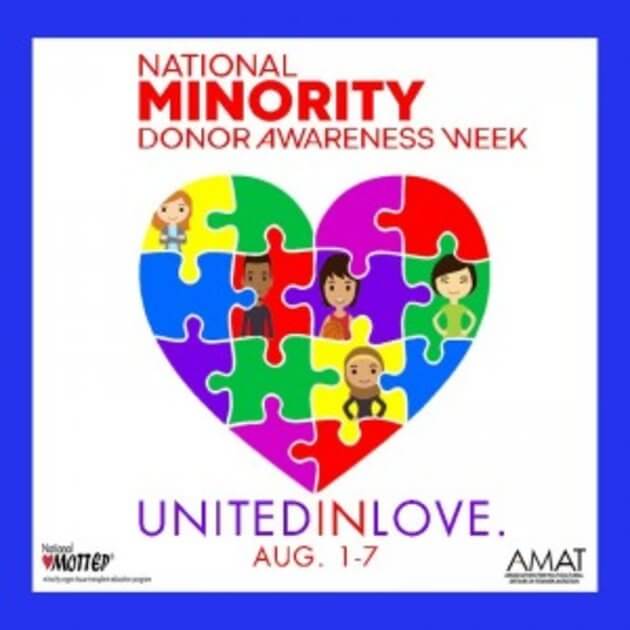National Minority Donor Awareness Week is celebrating its 22nd anniversary on August 1. What began as National Minority Donor Awareness Day (NMDAD) in 1996 is now celebrated as a week-long observance aimed at educating minority communities on obstacles and concerns about organ and tissue donation while highlighting its many triumphs. The Association for Multicultural Affairs in Transplant (AMAT) coordinates the week.

When NMDAD was inaugurated, 46,000 people were on the national transplant waiting list. That number has now reached over 114,000. The No. 1 problem in transplantation today remains the shortage of donors. Minorities wait twice as long for transplants and they continue to have a disproportionately higher incidence of diabetes, high blood pressure and heart disease, all of which lead to organ failure, especially kidney failure.
More than 20 persons die daily awaiting a transplant due to the donor shortage, therefore, National Minority Donor Awareness Week is another important effort to promote the positive messages that are necessary for the minority community to become organ and tissue donors.
The goal of National Minority Donor Awareness Week is to encourage all ethnic groups to 1) register to become an organ, eye and tissue donor; 2) have a family discussion and share their decision to be an organ, eye and tissue donor; and 3) open doors to their church, social or community group to encourage discussions on how to live healthier lives and how to save lives through organ, eye and tissue donation.
Anyone can register their decision to be a hero as an organ, eye and tissue donor at www.RegisterMe.Org
National statistics
American Indian
Currently, there are 1,046 American Indian/Alaska Natives in the US waiting for an organ transplant. In 2017, 270 American Indians received a lifesaving transplant from a generous donor.
African American
Currently, there are 33,015 African Americans waiting for a lifesaving transplant. In 2017, African Americans accounted for 2,130 donors that gave the gift of life.
Asian/Pacific Islander
In 2017, 1,998 Asians and Pacific Islanders received a lifesaving transplant from a generous donor. To date, there are 9,805 Asians and Pacific Islanders waiting for an organ transplant.
Hispanic
Currently, there are 22,599 Hispanics waiting for a lifesaving transplant. In 2017, Hispanics accounted for 2,276 that gave the gift of life.
General Facts
- One organ donor can save up to 8 lives
- Every 10 minutes another name is added to the national organ transplant waiting list
- An average of 22 people die each day because the organs they need are not donated in time
About the Association for Multicultural Affairs in Transplantation (AMAT)
AMAT was established in 1992 to address the increasing need for organ and tissue donors in the multicultural communities while simultaneously offering support, shared expertise and professional development opportunities for its members as they save and heal lives. AMAT is a self-sustaining, self-governed organization operating solely on voluntary contributions from individuals, corporations, and other affiliated organizations. For more information, visit: www.AMAT1.org.